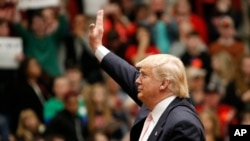Presidential candidates like Donald Trump are not supposed to win general elections, at least according to conventional wisdom. But if the last several months have demonstrated anything, it's that Donald Trump can defy conventional wisdom and get away with it.
The billionaire businessman Trump, who has never held political office, this week solidified his position as the Republican presidential frontrunner with a series of crucial wins on Super Tuesday, the primary election's single most important day of voting.
As he marches toward the Republican nomination, Trump has used a trademark formula for success, combining often extreme statements on issues of national security and immigration with an endless deluge of personal insults against his Republican rivals.
In some ways, it's an exaggerated version of an age old strategy for winning a U.S. presidential primary election: employ extreme rhetoric in order to appeal to the ideological, partisan voters who tend to make up the base of both major political parties.
However, once candidates have clinched their party's nomination, that same traditional wisdom says they should moderate their stances and scale back their inflammatory rhetoric, in an attempt to attract a wider base of support in the general election.
That's because party loyalists are completely different from general election voters, explains David Woodard, a political science professor at Clemson University. "Trump is the sort of street fighter who works well in the primary, but I think will just be a disaster in the general election."
In a general election, voters typically look to vote for a candidate who is relatable, or "kind of nice," says Woodard, who is also a Republican political strategist. "And that doesn't describe Donald Trump very well. I think it'll really be fatal for him."
Will Trump shift?
Trump himself seems to recognize the dangers of being too abrasive. On multiple occasions throughout his primary campaign, he has acknowledged he will have to change his "tone" and act "much different" if he were about to become president.
But can a man who has carefully cultivated the image as the ultimate outsider - someone who is not afraid to "tell it like it is" no matter whom he offends - possibly put the genie back in the bottle and pivot back toward a more mundane approach?
"I honestly don't know," says Scott McConnell, a founder of the American Conservative magazine. "I think he's capable of seeming more presidential and closing that deal, but he's got a long way to go."
Other analysts, such as Republican strategist Ford O'Connell, are more optimistic. "I do think that when he moves to the general election, he is going to change his tone and rhetoric," O'Connell says.
Trump: 'I'm a unifier'
There are signs Trump already may be making the shift. In his victory speech Tuesday, Trump focused more on inclusiveness than he has in past speeches.
"I'm a unifier. I know people are going to find that a bit hard to believe but believe me, I am a unifier," Trump declared. "I think we're going to be more inclusive, I think we're going to be more unified, and I think we're going to win in November."
The question is, will that strategy work, especially against such a formidable general election opponent as Hillary Clinton, who appears well on her way toward winning the Democratic Party nomination.
"It's hard to know, when every single rule of politics has been thrown out the window this election," said Mo Elleithee, who heads the Georgetown Institute of Politics and Public Service.
Elleithee, who worked on Clinton's 2008 presidential campaign, says Trump is "very beatable," but cautions against underestimating his appeal to general election voters. To effectively counter Trump, Clinton's team should focus on the billionaire's business record, he said.
"By making the case that he's not looking out for you, and he's really never been in this for anyone but himself - that's where there's some real opportunity to exploit weakness in Donald Trump," said Elleithee.
But don't expect Clinton to get involved in a battle of personal insults with Trump, Elleithee insists.
"I hope she doesn't. Because it sure didn't work for Marco Rubio," he said, referring to the Florida senator who has tried in recent days to match Trump insult for insult. "Marco Rubio tried to be Donald Trump-light, and it didn't work for him."
Newt Gingrich, a Republican political consultant and former speaker of the U.S. House of Representatives, also warns against taking an overly aggressive approach with Trump.
"I think Donald Trump is like the grizzly in 'The Revenant' (movie)," Gingrich told VOA. "If you attack him, he gets bigger and he gets meaner."


